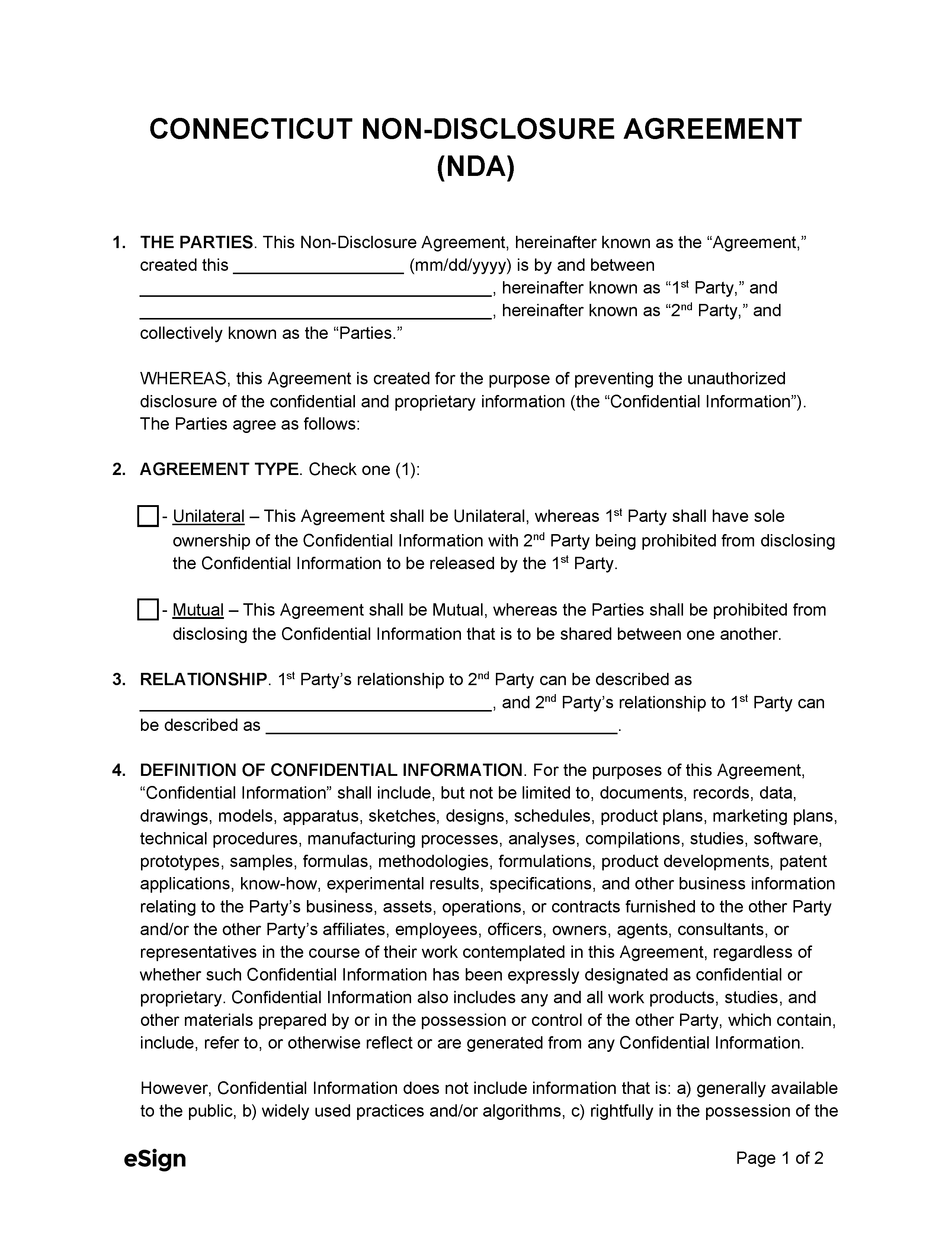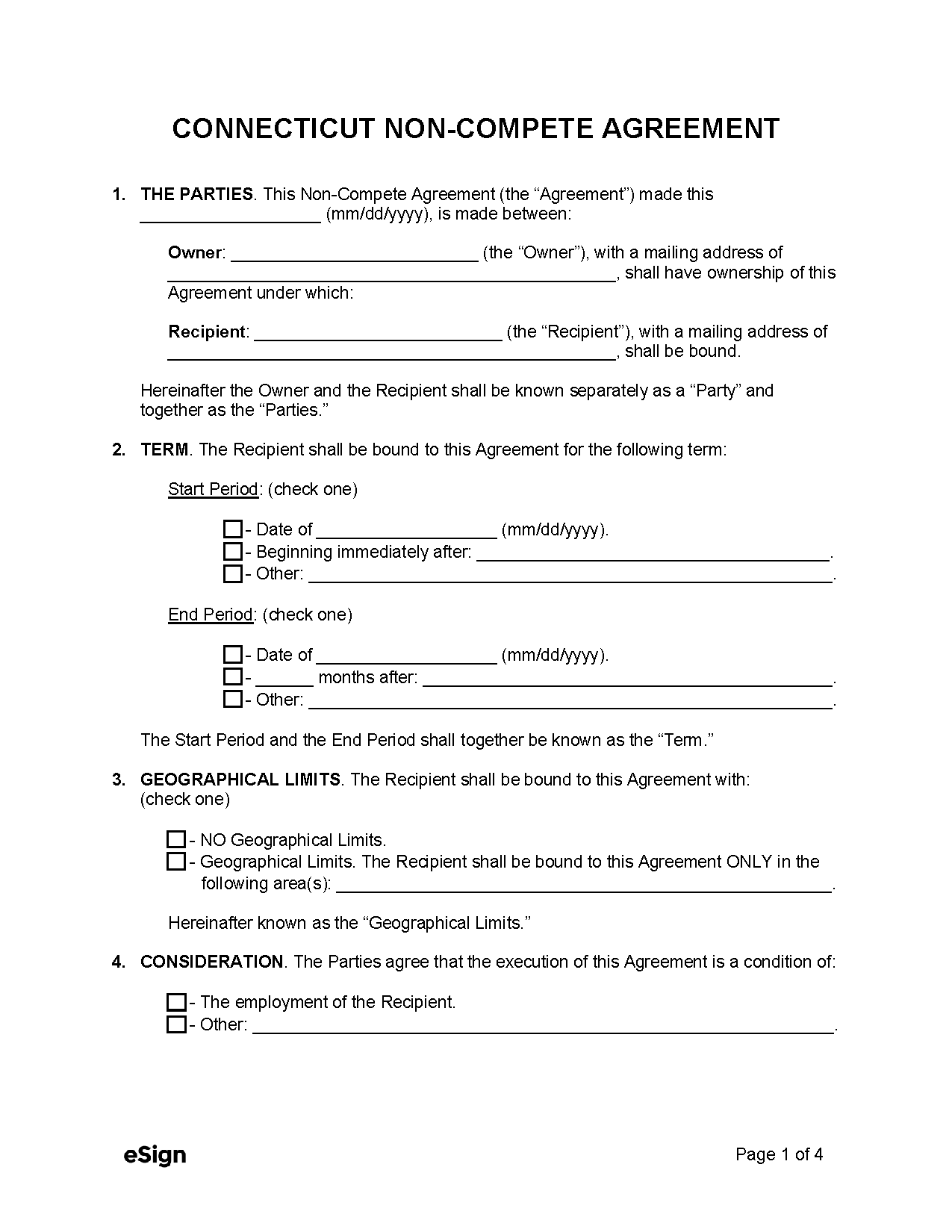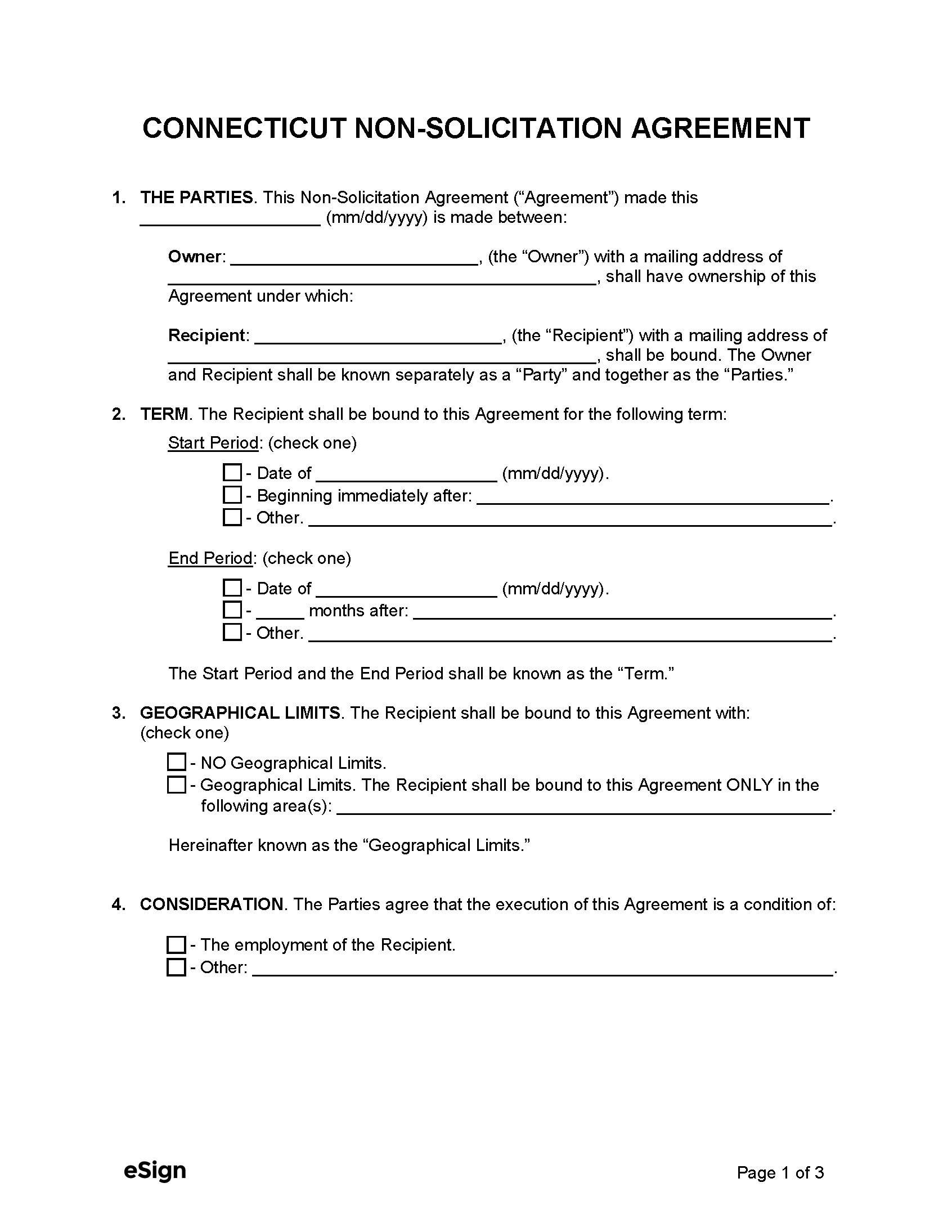Connecticut courts will generally deem non-compete agreements enforceable so long as their restrictions are reasonable. However, non-compete agreements for certain professions, such as security guards, physicians, or home health service workers, are unenforceable.
Contents |
Enforceability in Connecticut
In Connecticut, a non-compete agreement can be enforced to protect an employer from unfair competition from a former employee (except in certain areas of work). The courts will decide to enforce an agreement by evaluating five (5) criteria:
“1. The length of time the restriction operates;
2. The geographical area covered;
3. The fairness of the protection accorded to the employer;
4. The extent of the restraint on the employee’s opportunity to pursue his occupation;
5. The extent of interference with the public’s interests.”[1]
When it IS Enforceable
- Reasonable limitations. An NCAs reasonableness is determined on a case-by-case basis, taking into account various factors such as previous cases, the scope of the restrictions, and whether enforcement would negatively impact the public.[1]
- Medical practice. Non-compete agreements for physicians are enforceable, provided that the following applies:
- The non-compete is in accordance with the law and public policy.
- It is reasonable in duration, geographic scope, and restrictions.
- The duration does not exceed one (1) year.
- The geographic radius is not greater than fifteen (15) miles from the physician’s main place of work.
- The agreement was made before a valid partnership or ownership agreement.
- The physician’s employment was not terminated by the employer (unless the employer ended the employment due to cause).[3]
When it’s NOT Enforceable
- Security guards. Non-compete agreements are unenforceable for security guards unless their employer has given them access to trade secrets.[4]
- Broadcast employees. Workers employed in radio or television broadcasting cannot be bound to a non-compete agreement.[5]
- Homemakers, companions, and home health service workers. Covenants to not compete for individuals employed as homemakers, companions, or home health service workers are considered against public policy and unenforceable.[6]
- Legal practice. A lawyer cannot be restricted in their ability to practice law after leaving a firm.[7]
Maximum Time Period
There is no statutory limit for the duration of non-compete agreement effectiveness, with the exception of those restricting a physician, which cannot exceed one (1) year.[3]
Connecticut courts also take into account the agreement’s geographic scope. A longer duration can be enforced if the radius of the prohibited region isn’t too large.[8]
Examples of time restrictions deemed reasonable by Connecticut courts include:
- Two (2) years restricting an employee from working for their employer’s clients after their employment is terminated.[9]
- Five (5) years and a geographic restriction of twenty (20) miles from the employer’s area of business.[10]
- Five (5) years, due to an extensive customer list that required the employer years to compile.[11]
- Six (6) months due to the employee’s access to company trade secrets.[12]
Geographical Area
In Connecticut, the reasonableness of the contract’s geographic area is evaluated together with the duration of the agreement. Larger zones are more easily enforced if the agreement has a shorter period.[8]
In one case, a non-compete agreement without any specified geographic area was allowed by a Connecticut court due to the uniqueness and size of the company’s industry and, in turn, the reduced number of prospective buyers.[13]
Consideration
Non-compete agreements without consideration are invalid. Examples of sufficient consideration include employment, expanded employment, job promotions, or increased salary.[14] Continued employment is not considered enough consideration for a non-compete agreement, except for at-will employees in certain cases.[8][15]
Sources
- Robert S. Weiss & Assocs., Inc. v. Wiederlight, 208 Conn. 525, 529, 546 A.2d 216, 219 n.2 (1988)
- Deleo v. Equale & Cirone, LLP, 180 Conn. App. 744, 184 A.3d 1264 (Conn. App. Ct. 2018)
- Conn. Gen. Stat. § 20-14p
- Conn. Gen. Stat. § 31-50a
- Conn. Gen. Stat. § 31-50b
- Conn. Gen. Stat. § 20-681
- Connecticut Rules of Professional Conduct 5.6
- Van Dyck Printing Co. v. DiNicola, 43 Conn. Supp. 191, 648 A.2d 898 (Conn. Super. Ct. 1993)
- May v. Young, 125 Conn. 1, 6-7, 2 A.2d 385 (Conn. 1938)
- Ives Bros. v. Keeney, No. WWMCV064004952S, 2000 WL 35775696, at *9-10 (Conn. Super. Ct. Oct. 27, 2009)
- Scott v. Gen. Iron & Welding Co., 171 Conn. 132, 139-41, 368 A.2d 111, 116 (1976)
- Aetna Ret. Servs., Inc. v. Hug, No. CV970479974S, 1997 WL 396212, at *11 (Conn. Super. Ct. June 18, 1997)
- Xplore Technologies Corp. v. Killion, 2010 Ct. Sup. 19400 (Conn. Super. Ct. 2010)
- Torrington Creamery v. Davenport, 126 Conn. 515, 519-22 12 A.2d 780, 783 (Conn. 1940)
- Sartor v. Town of Manchester, 312 F. Supp. 2d 238, 244-45 (D. Conn. 2004)
- Braman Chem. Enterprises, Inc. v. Barnes, No. CV064020633S, 2006 WL 3859222, at *9 (Conn. Super. Ct. Dec. 12, 2006)
- Timenterial, Inc. v. Dagata, 29 Conn. Supp. 180, 182-86, 277 A.2d 512, 514-15 (Super. Ct. 1971)
- Gartner Grp. Inc. v. Mewes, No. CV91 0118332 S, 1992 WL 4766, at *5 (Conn. Super. Ct. Jan. 3, 1992)
Related Forms (2)

Download: PDF, Word (.docx), OpenDocument
Connecticut Non-Solicitation Agreement – Prohibits an employee from pursuing business transactions with co-workers and clients after their employment terminates.
Download: PDF, Word (.docx), OpenDocument

